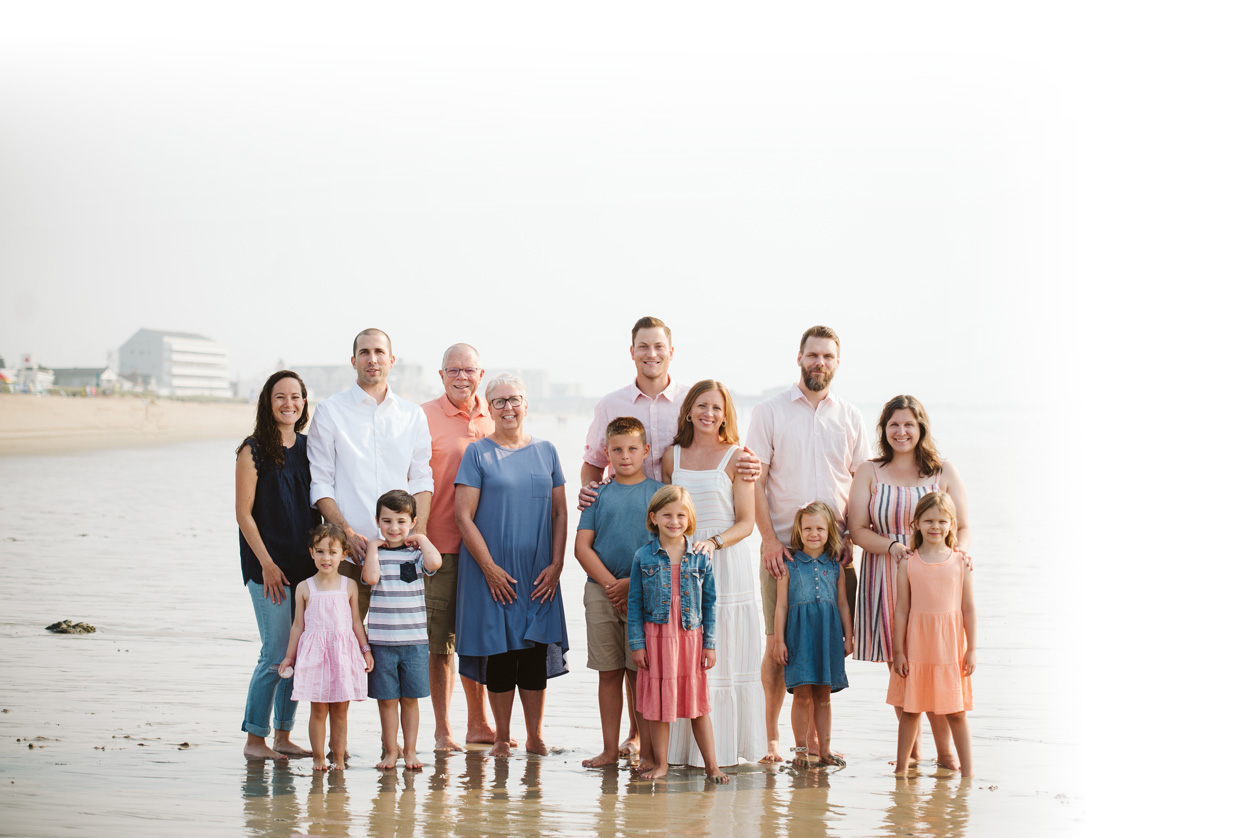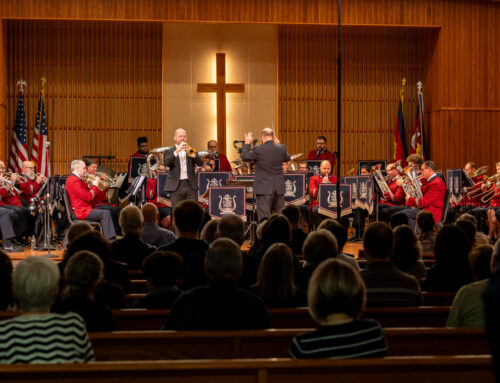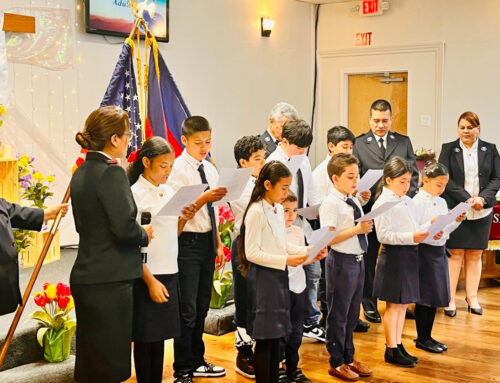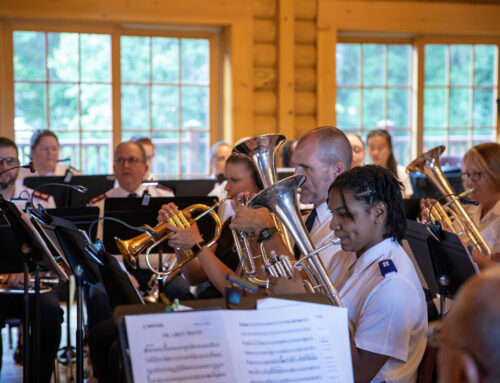
Lili Ditmer
Walk by the water
interview by Warren L. Maye
On the eve of their retirement, Commissioners William A. and G. Lorraine Bamford reflect on their ministry as leaders of The Salvation Army USA Eastern Territory and share their hope for the future.
What would you say are your highlights?
WB: Two highlights for me have been the past two commissioning events, starting in 2022. We were coming off COVID. The spiritual electricity started Friday night with [Christian singer–songwriter] Danny Gokey and the connectivity that he had with our attendees. Then in 2023, it was great seeing our territory together again. Our people want to worship and see God’s Kingdom together.
LB: A highlight for me came in seeing Salvationists, employees, and volunteers led by visionary officers during the COVID–19 pandemic. The Army saw and met those needs. It was tiring and draining, but in conversation with many officers, I learned it was also a blessing.
WB: Many people who we served during that time have now come to know the Lord. Some became soldiers because of the service we did. They saw how officers and soldiers cared for their community. Fellowship also continues to be a bright spot. We’re thinking outside the box, doing the same mission but in a different way.
What scenario seemed the most challenging?
LB: Aside from COVID, I’d say it was addressing the growing divisiveness in our society. There’s always been divisiveness, but now it’s more visible, more vocal. The evidence of hatred and resentment in our society is clearer, more palpable. The reality that this exists is heart–wrenching.
Has it influenced the way you’ve perceived ministry?
WB: We’ve tried to look at every situation, and every individual, with open eyes and open hearts. We are willing to embrace the whosoever. But it is a weighty subject. As we continue to survey this territory, which is extremely diverse, we see that challenge as a blessing and there’s more to be done. We need to make sure that people understand that everyone is created in God’s image, and we are all to be treated the same. Respect is the big thing.
LB: When you say you’re going to listen to everybody, you must listen. Doing so has led us to form “Express Councils” just within the past two years. They are for both soldiers and officers where each group can express concerns to leadership. Other open conversations with officers led by Lt. Colonel Ray Jackson and his team allow us to address tough issues and hear diverse voices.
So, you feel good about the progress you’ve made in this area?
WB: Yes. We have heard from the people. We’ve taken some steps they have recommended. Not everything can be adopted or accepted, but for the most part, I think we have focused on our mission, vision, and strategy.
One of the recommendations is that we focus on discipleship. We were on track with that even before that recommendation came out. The second one has to do with soldier and adherent development.
After COVID, people have said to us, “I feel like I lost that period in my ministry.” We certainly feel that way too. When I think back to March and April of 2020, I remember walking through Territorial Headquarters and nobody was here. Then I think how that impacted us. We like going to corps on Sunday to worship and see people interact. Because of COVID, we couldn’t do that. Now, we’ve been to a couple of corps in the past two months. On Easter Sunday, we went to Trenton, N.J. Just a great blend of people. The place was packed. We also love going to Portland, Maine. You’ve got the Adult Rehabilitation Center (ARC) beneficiaries attending along with individuals from the community. You’ve got people coming who are new to the Army. Some Salvationists are even coming from other countries such as Angola and Haiti. It’s a beautiful expression of ministry.
Have you seen any changes to these gatherings since COVID?
LB: Warmth in the room. COVID made us all reticent to physically embrace each other, to even shake hands. I think we can take some wisdom from that and yet not let it stop us from showing love to other people. Kudos to the ARC officers and employees who kept that residential ministry going during COVID.
WB: My concern for officer candidates has been a heavy burden for the past couple of years. I pray that young people and adults will truly be receptive to what God is asking them to do in full–time ministry. Today, we’ve got 18 candidates, and 12 are first–generation Salvationists. That tells me that we’re ministering the truth, we’re bringing people in, and they are coming to know the Lord and The Salvation Army. Yes, it’s beautiful.
The Spanish–speaking population is growing in our territory. How does that affect the Army’s ministry?
WB: These congregations have been a top priority for the Army and for us personally. We have translation available. At the training college, we have the Spanish track to help people in their journey. But I think in this moment we need to be aware of other people who are also coming to the United States from Africa and from Haiti.
LB: The growth of the Spanish speakers in the country is well represented in our congregations and that is beautiful to me. But not every person whose first language is Spanish is of the same culture. We need to honor people’s language and culture and assist them in their arrival and assimilation.
Migrants are being sent to the territory from other states. How has that affected the Army?
WB: It has put a demand on some of the basic needs that have to be met at a corps level.
So, we’re providing clothing, food, even housing. But then how do they get acclimated with work? We want to get people through the process but sometimes there’s government paperwork. For example, we know folks in Portland who’ve landed. They want to go to work but they’ve been told they must wait a year. So, during this interim, the Army is helping them live from day to day.
LB: One of the impacts we’ve seen is a major increase in the need for English as a second language (ESL). Indeed, it’s come to be called English as a new language (ENL) because English is not always someone’s second language. It might be their third or fourth.
I strongly believe that learning languages is good for the brain and that everyone should at least attempt to learn something. If you can at least say “hello” to someone in their home language, that’s a welcome sign right there.
What are your plans for retirement?
LB: We will take more walks by the water. That’s a big deal for us. We’re going to be at Old Orchard Beach and Asbury Park.
WB: For the first few months we’ll relax. We’re taking our grandkids and our kids to Disney in Florida. We’ve already had lots of good experiences with the family, but this time will be more focused. I also want to be a part of the ARC.
What is it about the ARC that moves you?
WB: My heart breaks for people who are in those situations of addiction. As a kid, I remember going to the ARC in Providence, R.I., just about every week. The men would come on Sunday night to the corps, and I saw their spiritual transformation. The ministry there was heartwarming.
LB: On many occasions people notice our uniform and say, “Thank you.” One woman said to me, “The Salvation Army saved my husband’s life from addiction.” Another gentleman was so thrilled that he let us know he was sober and gainfully employed.
WB: We also want to be a part of the day–to–day grit of a corps. So, we’ll find our niche because I believe that the linkage between the ARC and the corps is so important.
LB: I want to be involved in ministry to people who speak other languages. Perhaps I’ll teach English as a new language or help with intake.
What is your parting message to officers?
LB: Enjoy your ministry even amid difficulties because it is part of you. So, count the joys because they are a privilege.
WB: Stay close to Jesus, ask Him for help, guidance, and protection every day.
Read more from the latest issue of saconnects.




